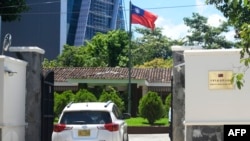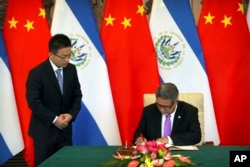ໄຕ້ຫວັນ ກັບສະຫະລັດອາເມຣິກາ ໄດ້ສະແດງຮ່ອງຮອຍໃຫ້ເຫັນວ່າ ມີຄວາມສໍາພັນ
ອັນແໜ້ນແຟ້ນຍິ່ງຂຶ້ນ ທີ່ນອກເໜືອໄປຈາກການທີ່ປະທານາທິບໍດີ ດໍໂນລ ທຣໍາ ຂອງ
ສະຫະລັດ ໃຊ້ໄທເປເພື່ອເປັນເກມໃນການຕໍ່ລອງໃນເລື້ອງເຈລະຈາກັບຈີນທີ່ຄົນສົງ
ໄສກັນຢູ່ນັ້ນອີກ, ອີງຕາມການສັງເກດການຂອງນັກ ວິເຄາະເຫດການ.
ພວກນັກວິເຄາະເຫດການ ຍັງເວົ້າອີກວ່າ ທ່ານ ທຣໍາ ມອງເຫັນໄຕ້ຫວັນວ່າ ເປັນພັນ
ທະມິດທາງການເມືອງຢູ່ໃນຂົງເຂດແຄມມະຫາສະໝຸດປາຊິຟິກ ແບບກວ້າງກວ່ານັ້ນ
ໃນຂະນະທີ່ພວກເຈົ້າໜ້າທີ່ ແລະສະມາຊິກລັດຖະສະພາຂອງສະຫະລັດ ເຫັນວ່າ ໄຕ້
ຫວັນແມ່ນເປັນຢາຖອນພິດໃຫ້ແກ່ຈີນ ທີ່ມີອໍານາດສູງກວ່າ ຢູ່ສະເໝີໄປນັ້ນ.
ທ່ານນາງ ຢຸນຊຸນ, ພະນັກງານຂັ້ນສູງຂອງໂຄງການພາກພື້ນເອເຊຍຕາເວັນອອກ ທີ່
ສູນສະຕິມຊັນ (Stimson) ຊຶ່ງເປັນສູນກາງຄົ້ນຄວ້າແຫ່ງນຶ່ງ ໃນນະຄອນຫລວງວໍຊິງ
ຕັນກ່າວວ່າ "ຂ້າພະເຈົ້າ ຄິດວ່າ ມັນບໍ່ເປັນທໍາປານໃດ ທີ່ຈະເວົ້າວ່າ ທ່ານທຣໍາ ໃຊ້ໄຕ້ຫວັນເປັນຕົວປະກັນໃນການຕໍ່ລອງ."
"ການໃຫ້ການສະໜັບສະໜຸນ ແລະເຫັນອົກເຫັນໃຈ ຕໍ່ໄຕ້ຫວັນ ແມ່ນສູງຫລາຍ ຢູ່
ໃນສະຫະລັດ" ນັ້ນຄືຄໍາເວົ້າຂອງທ່ານນາງ ຊຶ່ງທ່ານນາງອະທິບາຍອີກວ່າ "ອັນນີ້
ສ່ວນນຶ່ງກໍແມ່ນຍ້ອນເລື້ອງການເມືອງ, ແລະ ນອກນັ້ນແລ້ວ ກໍຍັງເປັນຍ້ອນການ
ປະພຶດທີ່ມີລັກສະນະກໍ່ກວນຂອງຈີນ. ມັນໄດ້ຊ່ວຍ ໃຫ້ມີການຂະຫຍາຍ ແລະເພີ້ມ
ທະວີຄວາມແຂງແກ່ນ ໃນການສະໜັບສະໜຸນຕໍ່ໄຕ້ຫວັນ ຢູ່ໃນສະຫະລັດ."
ຂໍ້ຕົກລົງທີ່ກ່ຽວຂ້ອງກັບການຊື້ຂາຍອາວຸດສອງສະບັບ, ຊຶ່ງເປັນຮ່າງກົດໝາຍອັນນຶ່ງ
ທີ່ຮຽກຮ້ອງໃຫ້ມີການໄປ-ມາຢ້ຽມຢາມກັນເພີ້ມຂຶ້ນອີກ ລະຫວ່າງເຈົ້າໜ້າທີ່ຂັ້ນສູງ
ຂອງວໍຊິງຕັນ ແລະໄທເປ ແລະໃຫ້ມີຄວາມຄິດເຫັນຫລາຍໆຢ່າງຈາກທາງສະຫະ
ລັດ ໃນການໃຫ້ການສະໜັບສະໜຸນຕໍ່ການພົວພັນທາງການທູດຂອງໄຕ້ຫວັນ ກັບ
ຕ່າງປະເທດໃນປີນີ້ ທີ່ໄດ້ເຮັດໃຫ້ມີການຢ້ານກົວກັນເພີ້ມຂຶ້ນວ່າ ທ່ານ ທຣໍາ ຈະໃຊ້
ການພົວພັນກັບໄທເປ ພຽງແຕ່ ເພື່ອໃຫ້ໄດ້ເອົາສິດທິຜົນປະໂຫຍດອອກຈາກຈີນ
ເທົ່ານັ້ນ.
Taiwan and the United States are showing signs of growing a solid relationship that goes beyond U.S. President Donald Trump's widely suspected use of Taipei as a bargaining chip in his administration's talks with China, analysts say.
The analysts say Trump is looking to Taiwan as part of a broader Pacific Rim political alliance, while officials and members of the U.S. Congress see Taiwan as an antidote to an ever-mightier China.
"I don't think it is completely fair to say that Trump is using Taiwan as a pawn," said Yun Sun, East Asia Program senior associate at the Stimson Center think tank in Washington.
"The support and sympathy for Taiwan is very strong here in the U.S.," she said. "This is partly due to the politics, but also is the result of China's bullying behaviors. It does help to broaden and strengthen the support base for Taiwan in the U.S."
Trend of improving relations
Two arms-related deals, a congressional bill that calls for more senior-level Taipei-Washington visits and a string of comments from the United States in support of Taiwan's foreign diplomacy this year have raised fears that Trump is using ties with Taipei just to get concessions out of China.
Two days after Taiwan cut ties Aug. 21 with El Salvador, the U.S. State Department expressed "grave concern" and warned the Central American country against taking economic incentives from China. Taiwan looks to U.S. ties to offset losses of small allies such as El Salvador.
In another sign of closer Taipei-Washington relations, Taiwan President Tsai Ing-wen made two unusually visible stops in the United States earlier this month over protests from Beijing. She gave a speech August 13 in Los Angeles. In Houston she became the first Taiwan president since the 1970s to visit federal property.
China sees self-ruled Taiwan as part of its territory, not as a country, and resents major powers such as the United States for interacting with it. China and Taiwan have been separately ruled since the Chinese civil war of the 1940s.
Move to check China
Since Tsai took office in 2016, Beijing has flown military aircraft near Taiwan at least a dozen times and, officials in Taipei say, persuaded five countries to drop Taiwan as an ally. Tsai rejects Beijing's condition for dialogue, that both sides talk as parts of the same country.
U.S. officials favor Taiwan now to ensure the Asian island's own relations with China don't change, said Bonnie Glaser, director of the China Power Project at the American think tank Center for International and Strategic Studies.
Washington has long advocated stability between China and Taiwan rather than one side provoking the other.
"U.S. policy makers aren't seeking ways to use Taiwan to increase leverage over China," Glaser said. "In response to stepped up military, political and economic pressure by Beijing on Taiwan, the Trump administration is signaling support for the maintenance of the cross-Strait status quo and for Taiwan's security."
Stronger Asia-Pacific alliance
Trump may see Taiwan as part of an Asia Pacific alliance that would resist China, said Lin Chong-pin, a retired strategic studies professor in Taiwan.
"He's also trying to unite the allies in the East Asian Pacific region to form a united front against China and to add pressure on China," Lin said. "Not only Japan, Australia and India, but Taiwan is also one them along with South Korea in forming a united front against China. That's the intention."
Washington stepped up military cooperation last year with Australia, India and Japan to keep the South China Sea open to international traffic. Beijing claims about 90 percent of that waterway.
Risk of use as a bargaining chip
Trump may see Taiwan as a "card" to play against China in getting what he wants from Sino-U.S. relations, said Alex Chiang, an international relations professor at National Chengchi University in Taipei. If the ruling Republican Party loses seats in mid-term elections this year, he added, the president may change his China policy and relations with Taiwan might slip.
"I think Trump is mainly thinking about the U.S. interests, and he is using Taiwan as a bargaining chip," Chiang said. "I don't know whether he will be able to continue to play (the) Taiwan card, because someday very soon there will not be any kind of benefit he can derive."
But Taiwan foreign minister Joseph Wu is unworried that his island will become a "bargaining chip in U.S. talks with China," the ministry quoted him saying last week.
Officials in Taipei should compile a "list" of what they want from the United States so they can achieve those goals, said Raymond Wu, managing director of Taipei-based political risk consultancy e-telligence.
"If we have a very clear idea about what Taiwan's interest is, then I don't think Taiwan will become someone else's pawn," Raymond Wu said. "We need to have some type of internal consensus."






